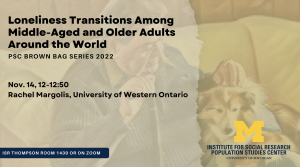Presented By: Population Studies Center
PSC Brownbag Series: Loneliness Transitions Among Middle-Aged and Older Adults Around the World
Rachel Margolis (University of Western Ohio)

The PSC Brown Bag Series runs live and on Zoom this fall, Mondays from 12 to 12:50 p.m.
Rachel Margolis of the University of Western Ontario presents: Loneliness Transitions among Middle-Aged and Older Adults around the World
Loneliness among older adults globally is an important social problem. Existing cross-sectional estimates of older adult loneliness lay between 20 and 30% with variation over age and country. To tackle the issue of older adult loneliness, we must move beyond cross sectional estimates of population levels of loneliness to: 1) examine to what extent older adult loneliness is a chronic issue or whether it is common to transition in and out of loneliness; 2) take a life course perspective to examine how common life course changes in family, co-residence, work, and health affect transitions in and out of loneliness; and 3) examine how patterns and predictors of older age loneliness vary around the world. This paper charts loneliness trajectories for 18 countries and finds remarkable consistency in the important predictors of changes in loneliness in older age around the world. This highlights the grave importance of family and household connections, and to a lesser extent, work and health, in affecting loneliness.
Rachel Margolis of the University of Western Ontario presents: Loneliness Transitions among Middle-Aged and Older Adults around the World
Loneliness among older adults globally is an important social problem. Existing cross-sectional estimates of older adult loneliness lay between 20 and 30% with variation over age and country. To tackle the issue of older adult loneliness, we must move beyond cross sectional estimates of population levels of loneliness to: 1) examine to what extent older adult loneliness is a chronic issue or whether it is common to transition in and out of loneliness; 2) take a life course perspective to examine how common life course changes in family, co-residence, work, and health affect transitions in and out of loneliness; and 3) examine how patterns and predictors of older age loneliness vary around the world. This paper charts loneliness trajectories for 18 countries and finds remarkable consistency in the important predictors of changes in loneliness in older age around the world. This highlights the grave importance of family and household connections, and to a lesser extent, work and health, in affecting loneliness.